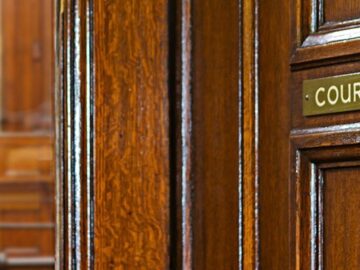A former detective wrongly claimed that a solicitor representing journalists who had been subject to unlawful police surveillance attempted to buy a firearm, a tribunal heard.
Darren Ellis alleged in a closed hearing that solicitor Niall Murphy was allegedly involved in buying a firearm, after discovering a WhatsApp message sent as joke on a phone seized by police from a journalist he represented.
The allegations emerged in a hearing of the Investigatory Powers Tribunal, which is investigating claims the Police Service of Northern Ireland (PSNI), Durham Constabulary and the Metropolitan Police unlawfully spied on the phones of journalists Trevor Birney and Barry McCaffrey.
The PSNI and Durham police unlawfully arrested Birney and McCaffrey in 2018 as part of an operation designed to flush out a confidential source that supplied information for their film documentary exposing police collusion in paramilitary killings in Loughinisland in 1994.
The court previously heard that Darren Ellis, the senior investigating officer in the case, had written to the Law Society of Northern Ireland asking it to investigate Murphy’s law firm, KRW, but was disappointed when the regulator decided not to intervene.
Evidence made public in the tribunal yesterday revealed that Ellis had made the firearms allegations based on the contents of a picture sent as a joke on the journalists’ seized phones.
Notes made by an investigating officer recorded that in a WhatsApp Message on 18 December 2018, McCaffrey had asked Murphy if he knew of anyone interested in a “9mil with two clips and about 20 shells”.
The WhatsApp message, recovered by the journalists and presented to the court yesterday, showed an image of a 9mm spanner, two small paper clips and a box of sea shells.
Ben Jaffey KC, representing the journalists, claimed that Ellis could not have possibly believed the WhatsApp message was in earnest. “Even Ellis can understand a joke,” he said, claiming that McCaffrey’s “only offence was his sense of humour”.
He said reference to the WhatsApp message, and another associated message exchanged by McCaffrey and Murphy, showed that police appeared to have read their legally privileged communications.
“There seems to have been an extensive investigation of materials that were likely to be privileged in an investigation,” he told the court.
Cathryn McGahey KC, representing the Police Service of Northern Ireland, argued that Ellis may have read the text but not seen the picture, noting that she did “not suggest for one moment it was true that Murphy was involved in supplying firearms”.
Stephen Toal KC, representing Birney, argued that this was further evidence of an unbalanced investigation by Ellis.
On Wednesday, it emerged that the detective behind the “unlawful” surveillance of McCaffrey and Birney blamed Catholics for a “perverse’’ court decision.
According to Ellis, a senior police officer at the PSNI, warned him that Irish judges were, in effect, “sectarians in robes”.
In a statement responding to Ellis’s allegations, Barbara Gray, the officer in question, said she was “deeply angered” by Ellis’s suggestion she had questioned the independence of the judiciary.
The court also heard that Ellis had emailed officers in the PSNI criticising the lord chief justice of Northern Ireland, Declan Morgan, for ruling that the PSNI had unlawfully obtained warrants to arrest the two journalists.
The email described the lord chief justice’s decision as an “absolute outrage” that “beggars belief”. Ellis claimed he had only criticised the lord chief justice because he did not give the PSNI enough time to respond.
Toal described Ellis’s attitude to the journalists, lawyers and the judiciary as “deeply disturbing”, and claimed that the former detective saw McCaffrey and Birney “as terrorists who were politically motivated to embarrass the police”.
He went on, “For press freedom to win, the police must lose this case”.
The case continues today.




